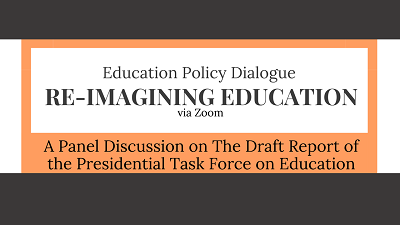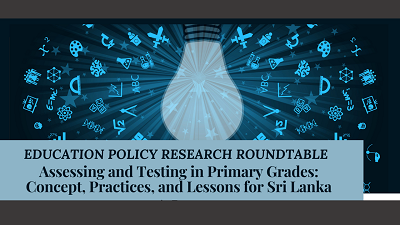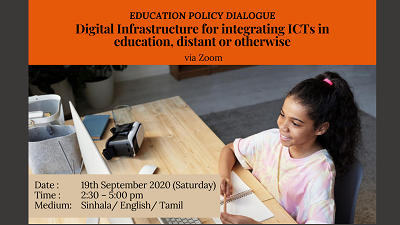Published by Coordinator on behalf of Mr. RC Perera (rclarance@yahoo.com) Early Childhood Education (ECE) · It starts with Early Childhood Education (ECE). Under the ECE issues it talks about feature such as subject oriented teaching, administering written tests, untrained teachers, etc. · Those issues are ok.
Trends In International Mathematics and Science Study (TIMSS) and Progress In International Reading Literacy Study (PIRLS) are international assessments that monitor trends in student achievement in mathematics, science, and reading. Currently 70 countries participate in the assessments, which have been conducted at regular intervals since 1995. The Programme for International Student Assessment (PISA) is the Organisation for Economic Co-operation and Development (OECD)’s Programme for International Student Assessment. PISA measures 15-year-olds’ ability to use their reading, mathematics and science knowledge and skills to meet real-life challenges. With a growing number of countries taking part in International Large-Scale Assessments (ILSAs) such as TIMSS, PIRLS and PISA, it is timely to question their relevance for Sri Lanka.

A policy dialogue on equitable access to distance education was held by the Education Forum Sri Lanka (EFSL) in collaboration with the Development Partners Secretariat on December 08 , 2020, via Zoom. Video: Click here Presentation: Equitable Access to Distance Education OVERVIEW: The discussion revolved around the themes of 1) universal access to distance education, and 2) the quality of education provided. In his opening remarks, Mr. Patrick Vandenbruaene, Head of Development Partners Secretariat Sri Lanka, noted that COVID-19 could be the stimulus that we have needed to transform education, and he hoped the forum would generate new ideas towards this end. The forum discussions revealed that although internet access by households in Sri Lanka remains under 50% (LIRNEasia, 2018; EFSL & World Vision, 2020) it is in fact possible to ensure a quality learning experience for ALL children for 2021 if we optimize the use of existing digital technology and content, and adopt a more student-centered and student-led approach to teaching.
Policy Dialogues | Budget 2021 | Reopening of Schools | Grade 5 Scholarship and G.C.E. A/L Examinations Held | G.C.
Source: Daily Mirror <http://www.dailymirror.lk/front_page/Children-climb-on-to-60-feet-high-water-tank-for-online-education/238-200868> The above picture of students climbing a 60-foot water tank in order to access phone signal to engage in school classes highlights the difficulties that students across the country have faced over the past 9 months in engaging in distance education. As the year nears its end and plans for 2021 come underway, policy makers, government officials, educators and other relevant stakeholders need to consider the most viable, effective education-related solutions to ensure that no child is left behind. Although internet access is frequently hailed as the way forward (and it no doubt is an increasingly essential component of effective distance education) nation-wide internet coverage is not a solution that we can expect to be successfully implemented for the start of the new year.
To our knowledge, the non-state sector in higher education in Sri Lanka is largely undocumented. The only comprehensive survey available was carried out by the Education Forum Sri Lanka (EFSL) in 2012 in partnership with LIRNEAsia and the Ceylon Chamber of Commerce. The information is reposted here in the public interest. The higher education landscape is captured as a directory  of Higher education opportunities in Sri Lanka containing a listing of all degree programs offered by alternative higher education institutions or institutions that are outside the purview of the University Grants Commission (UGC) mediated system of 14 public universities and affiliated Institutions. The alternative system consists of: 10 PUBLIC institutions which admit students on their own charging nominal to significant amounts as fees and offering 41 degree programs.

A dialogue reviewing the report was held on November 21, 2020, via Zoom LINKS Full Video: PD#9, 2 hours 30 minutes Documents: Summary PTF Report; Core Group Reports OVERVIEW: The education reform plan of the Presidential Task Force is visionary and comprehensive, but it does not address (1) Strategies for effective implementation (2) Limitations such as political interference(3) Inefficiencies in administration, (4) Lack of empowerment of teachers, and the (5) Reality of insufficient funding. A more strategic approach identifying a few pivotal strategies and how they can be implemented is needed. EFSL will present a brief on such a strategic approach using the inputs from this dialogue. PRESENTATIONS School education – Dr. Tara De Mel, Education Forum Sri Lanka (EFSL) Tertiary Education including higher education – Prof Arjuna Parakrama, University of Peradeniya – IT enabled education – Ms.

Held on October 17, 2020, via Zoom VIDEO Link PRESENTATIONS Assessments in Primary Education  with a focus on  the Grade five Scholarship Examination in Sri Lanka Ms. Sanuja Goonetilleke and Dr. Sujata Gamage, Education Forum Sri Lanka (EFSL) Review Panel Professor Angela Little, Professor Emerita at UCL Institute of Education, UK Dr. Longkai Wu, Research Scientist at the National Institute of Education, Singapore (Presentation) Mr. Muthu Sivagnanam, Former Director of Primary Education, Ministry of Education, Sri Lanka Moderator Dr.

Held on September 19, 2020, via Zoom VIDEO:Â Click here PRESENTATIONS Introduction – Dr. Tara de Mel Master Plan for ICT in Education -Â Prof. Kapila Perera, Secretary, Ministry of Education and former Vice Chancellor, University of Moratuwa Digital Infrastructure – Mr. Indika de Zoysa, Vice President, Enterprise Business Group, Huawei Technologies Lanka Integrating ICT into Education – Mr. Hasitha Dela, CEO, Headstart Response & Comments – Dr.
Click here for the video. Prof. Veranja Karunarathna, Professor of Chemistry at the University of Peradeniya and Vice Chancellor of Slintec Academy, noted in his presentation that there has been a definite reduction in quality of graduate education over the years due to many factors, but showed that Sri Lanka does produce a high number of academic papers by graduate students and researchers per dollar invested in comparison to many countries. He also spoke on the negative impact of irregular appointments and promotions within universities; and the need for the appointment of Vice Chancellors to be on a merit-based system. The small number of PhDs conferred by Sri Lankan universities and the corresponding low amount of research was also a matter of concern in the global reputation of Sri Lankan universities.
 A policy dialogue on equitable access to distance education was held by the Education Forum Sri Lanka (EFSL) in collaboration with the Development Partners Secretariat on December 08 , 2020, via Zoom. Video: Click here Presentation: Equitable Access to Distance Education OVERVIEW: The discussion revolved around the themes of 1) universal access to distance education, and 2) the quality of education provided. In his opening remarks, Mr. Patrick Vandenbruaene, Head of Development Partners Secretariat Sri Lanka, noted that COVID-19 could be the stimulus that we have needed to transform education, and he hoped the forum would generate new ideas towards this end. The forum discussions revealed that although internet access by households in Sri Lanka remains under 50% (LIRNEasia, 2018; EFSL & World Vision, 2020) it is in fact possible to ensure a quality learning experience for ALL children for 2021 if we optimize the use of existing digital technology and content, and adopt a more student-centered and student-led approach to teaching.
A policy dialogue on equitable access to distance education was held by the Education Forum Sri Lanka (EFSL) in collaboration with the Development Partners Secretariat on December 08 , 2020, via Zoom. Video: Click here Presentation: Equitable Access to Distance Education OVERVIEW: The discussion revolved around the themes of 1) universal access to distance education, and 2) the quality of education provided. In his opening remarks, Mr. Patrick Vandenbruaene, Head of Development Partners Secretariat Sri Lanka, noted that COVID-19 could be the stimulus that we have needed to transform education, and he hoped the forum would generate new ideas towards this end. The forum discussions revealed that although internet access by households in Sri Lanka remains under 50% (LIRNEasia, 2018; EFSL & World Vision, 2020) it is in fact possible to ensure a quality learning experience for ALL children for 2021 if we optimize the use of existing digital technology and content, and adopt a more student-centered and student-led approach to teaching.  A dialogue reviewing the report was held on November 21, 2020, via Zoom LINKS Full Video: PD#9, 2 hours 30 minutes Documents: Summary PTF Report; Core Group Reports OVERVIEW: The education reform plan of the Presidential Task Force is visionary and comprehensive, but it does not address (1) Strategies for effective implementation (2) Limitations such as political interference(3) Inefficiencies in administration, (4) Lack of empowerment of teachers, and the (5) Reality of insufficient funding. A more strategic approach identifying a few pivotal strategies and how they can be implemented is needed. EFSL will present a brief on such a strategic approach using the inputs from this dialogue. PRESENTATIONS School education – Dr. Tara De Mel, Education Forum Sri Lanka (EFSL) Tertiary Education including higher education – Prof Arjuna Parakrama, University of Peradeniya – IT enabled education – Ms.
A dialogue reviewing the report was held on November 21, 2020, via Zoom LINKS Full Video: PD#9, 2 hours 30 minutes Documents: Summary PTF Report; Core Group Reports OVERVIEW: The education reform plan of the Presidential Task Force is visionary and comprehensive, but it does not address (1) Strategies for effective implementation (2) Limitations such as political interference(3) Inefficiencies in administration, (4) Lack of empowerment of teachers, and the (5) Reality of insufficient funding. A more strategic approach identifying a few pivotal strategies and how they can be implemented is needed. EFSL will present a brief on such a strategic approach using the inputs from this dialogue. PRESENTATIONS School education – Dr. Tara De Mel, Education Forum Sri Lanka (EFSL) Tertiary Education including higher education – Prof Arjuna Parakrama, University of Peradeniya – IT enabled education – Ms.  Held on October 17, 2020, via Zoom VIDEO Link PRESENTATIONS Assessments in Primary Education  with a focus on  the Grade five Scholarship Examination in Sri Lanka Ms. Sanuja Goonetilleke and Dr. Sujata Gamage, Education Forum Sri Lanka (EFSL) Review Panel Professor Angela Little, Professor Emerita at UCL Institute of Education, UK Dr. Longkai Wu, Research Scientist at the National Institute of Education, Singapore (Presentation) Mr. Muthu Sivagnanam, Former Director of Primary Education, Ministry of Education, Sri Lanka Moderator Dr.
Held on October 17, 2020, via Zoom VIDEO Link PRESENTATIONS Assessments in Primary Education  with a focus on  the Grade five Scholarship Examination in Sri Lanka Ms. Sanuja Goonetilleke and Dr. Sujata Gamage, Education Forum Sri Lanka (EFSL) Review Panel Professor Angela Little, Professor Emerita at UCL Institute of Education, UK Dr. Longkai Wu, Research Scientist at the National Institute of Education, Singapore (Presentation) Mr. Muthu Sivagnanam, Former Director of Primary Education, Ministry of Education, Sri Lanka Moderator Dr.  Held on September 19, 2020, via Zoom VIDEO: Click here PRESENTATIONS Introduction – Dr. Tara de Mel Master Plan for ICT in Education - Prof. Kapila Perera, Secretary, Ministry of Education and former Vice Chancellor, University of Moratuwa Digital Infrastructure – Mr. Indika de Zoysa, Vice President, Enterprise Business Group, Huawei Technologies Lanka Integrating ICT into Education – Mr. Hasitha Dela, CEO, Headstart Response & Comments – Dr.
Held on September 19, 2020, via Zoom VIDEO:Â Click here PRESENTATIONS Introduction – Dr. Tara de Mel Master Plan for ICT in Education -Â Prof. Kapila Perera, Secretary, Ministry of Education and former Vice Chancellor, University of Moratuwa Digital Infrastructure – Mr. Indika de Zoysa, Vice President, Enterprise Business Group, Huawei Technologies Lanka Integrating ICT into Education – Mr. Hasitha Dela, CEO, Headstart Response & Comments – Dr. 